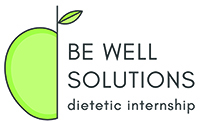A career in dietetics offers endless possibilities. From clinical to community, research, sports, marketing, entrepreneurship, wellness, writing, and beyond, there’s a career path to match your interests.
The Be Well Solutions Dietetic Internship (BWS DI) program prepares interns to enter various nutrition-related fields and career opportunities. The BWS DI alumni are real-life examples of this. They have successfully carved out diverse and rewarding careers in dietetics.
You can create your dream career as a Registered Dietitian Nutritionist. This blog post will help you envision the possibilities. We’ll spotlight real BWS DI alumni careers and showcase some opportunities available to individuals who have completed their dietetic internships and passed the national exam.
The Pathway to Becoming a Registered Dietitian Nutritionist (RDN)
Registered Dietitian Nutritionists (RDN) are food and nutrition experts. They are trained to provide evidence-based nutrition therapy and guidance. Becoming an RDN involves academic coursework, supervised practice from an ACEND-accredited program such as Be Well Solutions Dietetic Internship Program, and passing a national exam. After becoming an RDN, a wide range of exciting opportunities open up, and we’ll explore them below.
Find more information about the pathway to becoming a Registered Dietitian Nutritionist (RDN) on our website here.
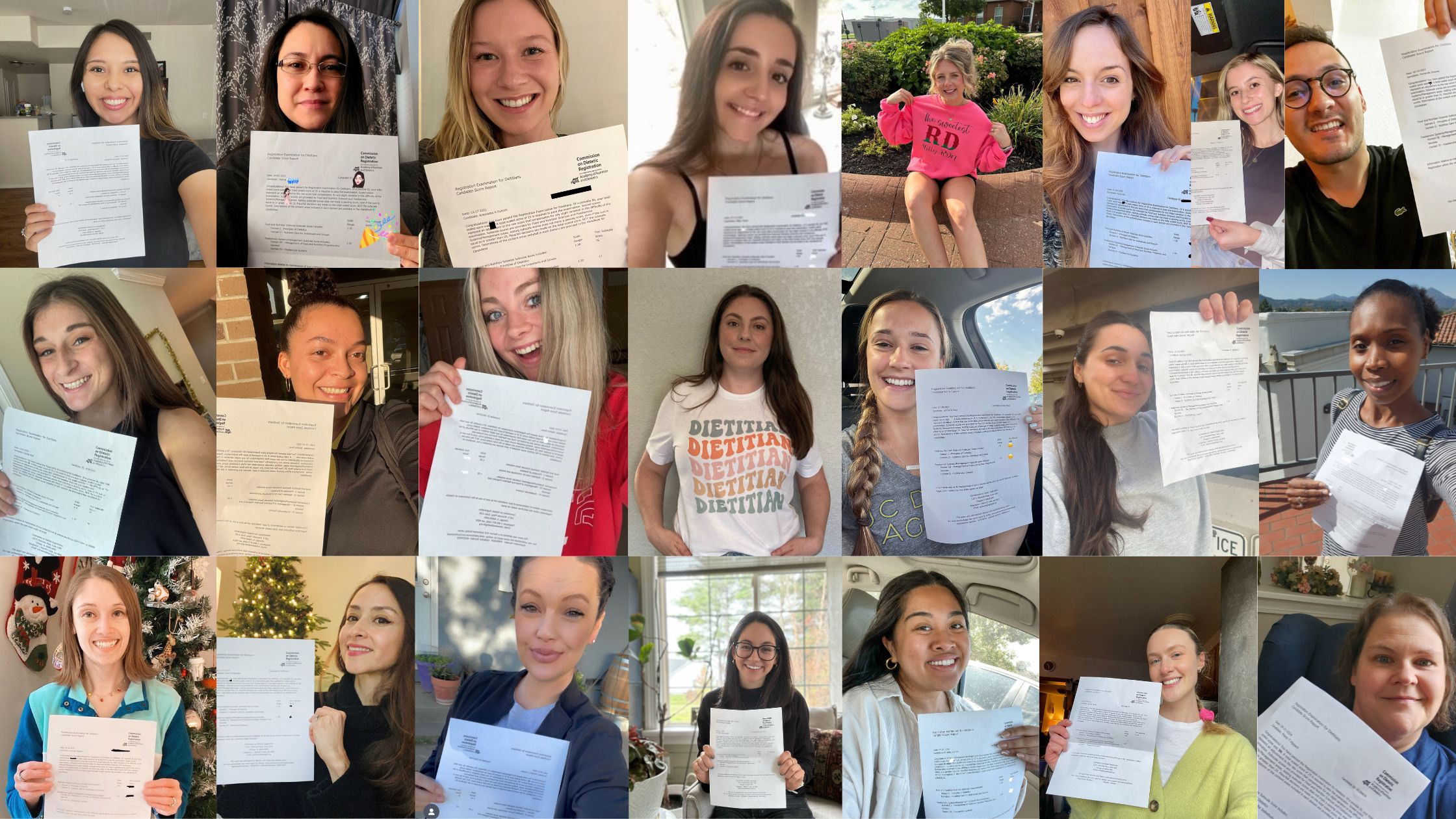
BWS DI Alumni celebrating passing the RDN exam!
Career Paths for Dietitians
You can create your dream career path as a dietitian. A great deal of flexibility and variety is available in the nutrition field. Many RDs explore multiple areas of practice throughout their careers.
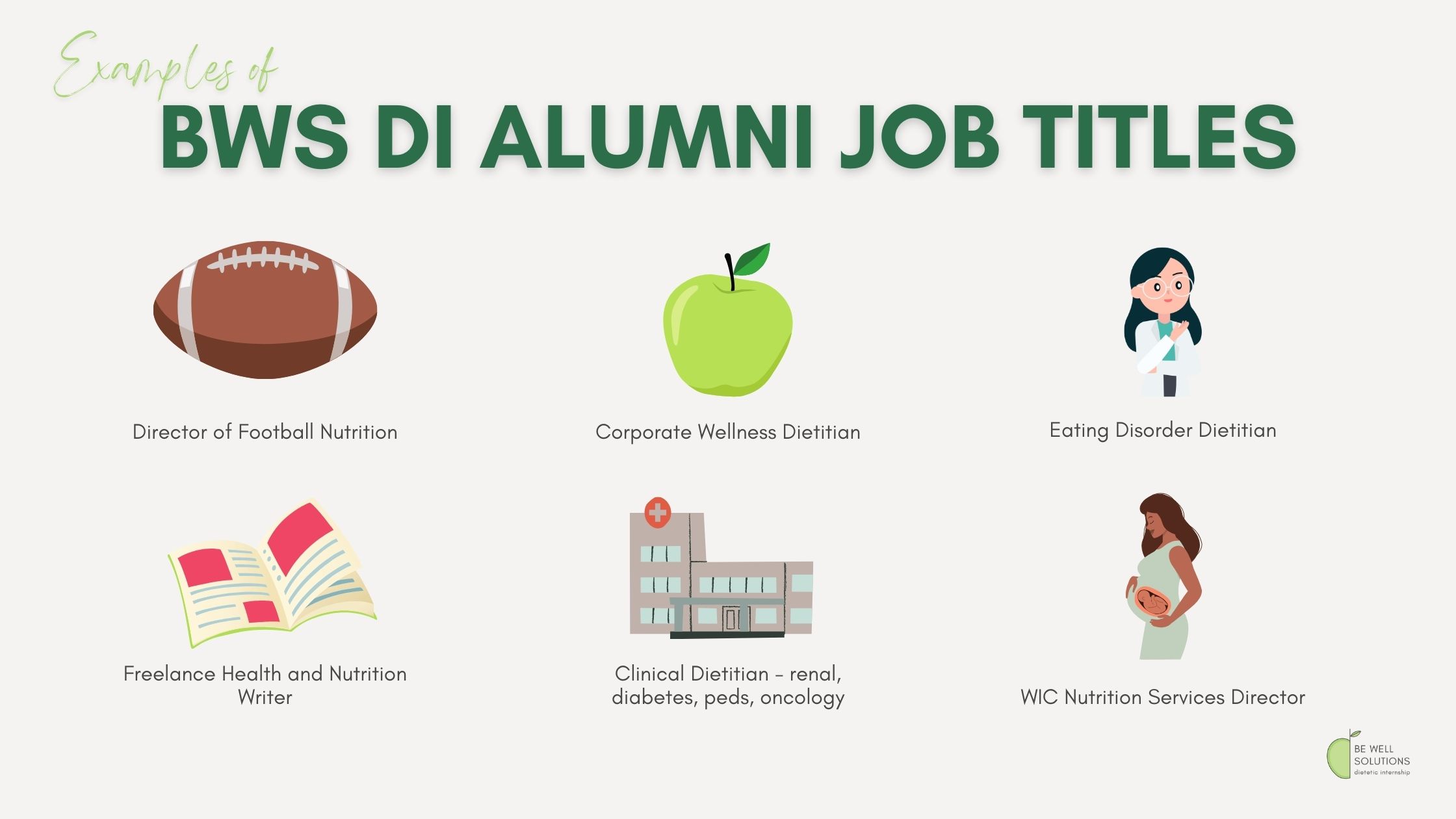
Here are just a few career opportunities available to registered dietitians:
- Clinical Dietitian – Work in hospitals, long-term care facilities, or outpatient clinics, providing medical nutrition therapy to patients. Even within clinical dietetics, there is a large variety of specialties, including oncology, bariatrics, and renal.
- Sports Dietitian – Help athletes and teams optimize performance through nutrition strategies tailored to their training and recovery needs. Sports dietitians often work with college teams, professional teams, or in private practice.
- Corporate Wellness Dietitian – Partner with companies to create employee wellness programs, improve workplace nutrition, and provide coaching. In addition to company-wide programs, this path could involve conducting one-on-one sessions and group classes.
- Community Dietitian – Work with public health organizations, nonprofits, or government programs to improve nutrition access and education.
- Private Practice Dietitian – Run your own business, offering 1:1 nutrition counseling, group programs, or online coaching.
- Pediatric Dietitian – Specialize in nutrition for infants, children, and adolescents, working in hospitals, clinics, or private practice.
- Eating Disorder Dietitian – Provide medical nutrition therapy and support for individuals battling and recovering from eating disorders.
- Geriatric Dietitian – Focus on nutrition for older adults in skilled nursing facilities, rehabilitation centers, or home health settings.
- Foodservice Management Dietitian – Oversee nutrition programs in schools, healthcare facilities, or corporate dining settings.
- Academic and Research Dietitian – Teach at universities, conduct research, or contribute to evidence-based nutrition advancements.
- Media and Communications Dietitian – Write for health publications, develop social media content, or appear as a nutrition expert in the media.
- Nutrition Writer and Author – Contribute to blogs, magazines, books, and online publications, sharing evidence-based nutrition information.
- Product Development Dietitian – Work with food brands to create and market nutritious products.
- Public Health Policy Dietitian – Develop and advocate for nutrition-related policies and programs that improve the health of communities on a local, state, or national level.
BWS DI Prepares You to Explore Multiple Career Avenues
One advantage of completing a distance dietetic internship with BWS DI is the flexibility in creating your rotation schedule. Our program empowers you to take an active role in shaping your internship experience to align with your interests and goals.
You also have the option to complete an elective rotation, which allows you to dive deeper into a specialty area of interest. Interns at BWS DI have used this rotation to explore paths such as private practice, nutrition communications, sports nutrition, functional medicine, bariatric nutrition, eating disorders, research, policy, and more.
These experiences help our interns build valuable connections and gain hands-on experience in their areas of interest, which gives them a competitive edge when applying for jobs after the internship.
BWS DI Alumni Spotlight: What Are They Now?
We’re so excited for our program alumni and the wide range of career paths they’ve pursued after completing the BWS DI. They are real-life examples of the many opportunities available to dietitians.
Below, we will highlight a few of our incredible alumni and the roles they’ve taken in the field of dietetics. They’ve also offered some valuable advice for dietetic interns about to start their internship journeys.
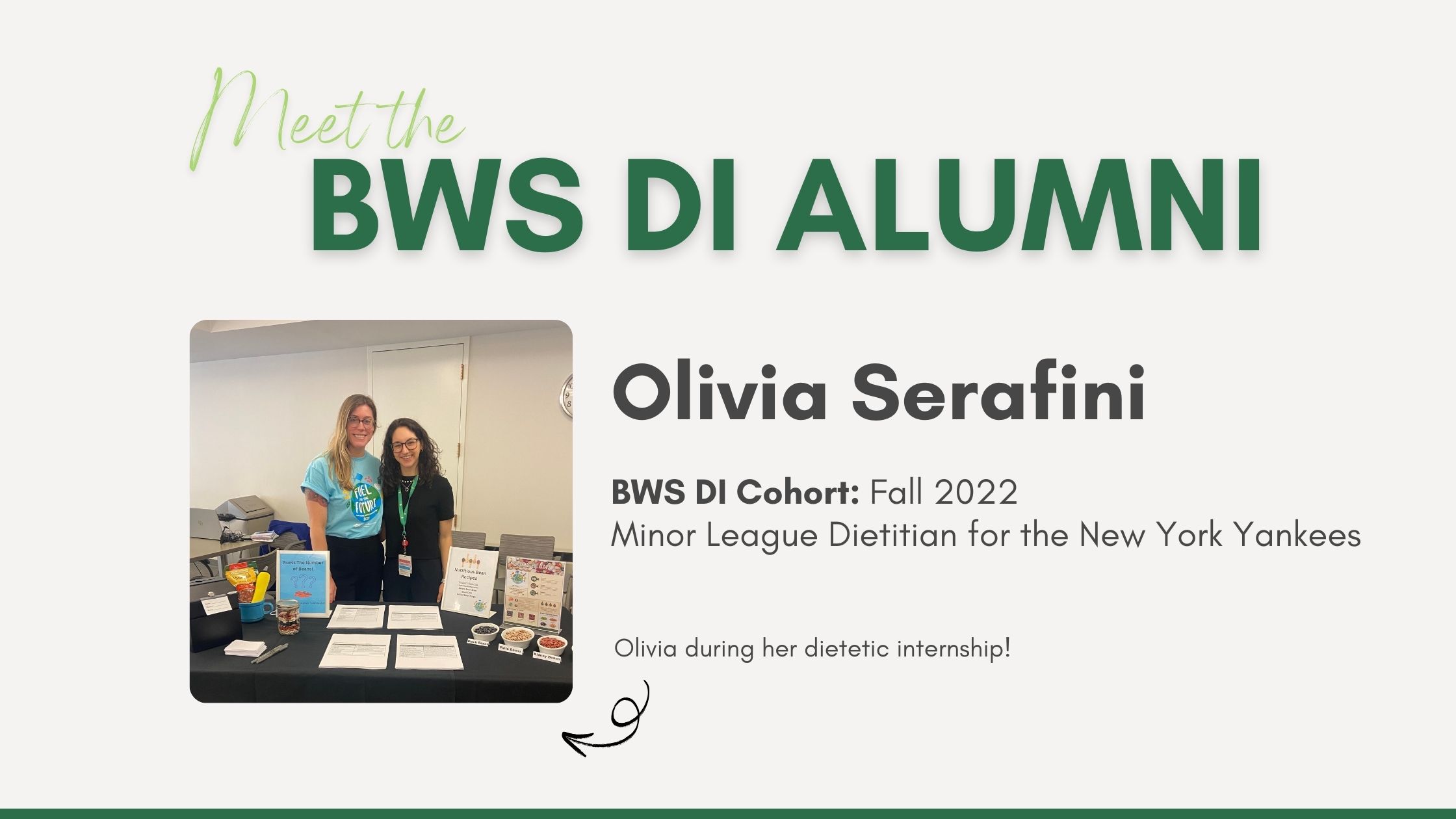
Olivia Serafini: Minor League Dietitian for the New York Yankees
-
What is your current job title?
Minor League Dietitian for the New York Yankees
-
What’s a typical day like in your current position?
Every day is different! That’s one of the cool things about this job. My responsibilities include restocking the fuel station, preparing smoothies for players before and after practice, providing one-on-one consultations with players on their nutrition needs, organizing catering orders for the teams, and reviewing menus. There’s never a dull moment, and the variety keeps things interesting!
-
What’s your favorite part of your job?
The most rewarding part of my job is seeing the players succeed. Watching them achieve their goals and witnessing their excitement about their progress creates stronger buy-in to the importance of nutrition in their development. As a sports dietitian, building meaningful relationships with athletes is incredibly fulfilling. Being a part of their journey and contributing to their success is what makes this career so special.
-
How did BWS DI help prepare you for the work you do now?
BWS DI played a pivotal role in preparing me for my current position by connecting me with an amazing preceptor during my sports nutrition rotation. This preceptor, who was also a BWS DI alumnus, provided valuable mentorship and guidance that ultimately helped launch my career in baseball nutrition.
-
Do you have any advice or tips for interns about to start their dietetic internship?
My advice for interns starting their dietetic internship is to approach each rotation with an open mind. Every experience offers something valuable, regardless of the field you end up specializing in. Building connections is also essential, as these relationships will support you not only during your internship but throughout your career as an RD. Finally, make sure to prioritize self-care. The internship can be intense, with long hours and study time, and it’s easy to overlook your own well-being. I wish I had done a better job of managing my time and ensuring I took breaks when I was an intern!
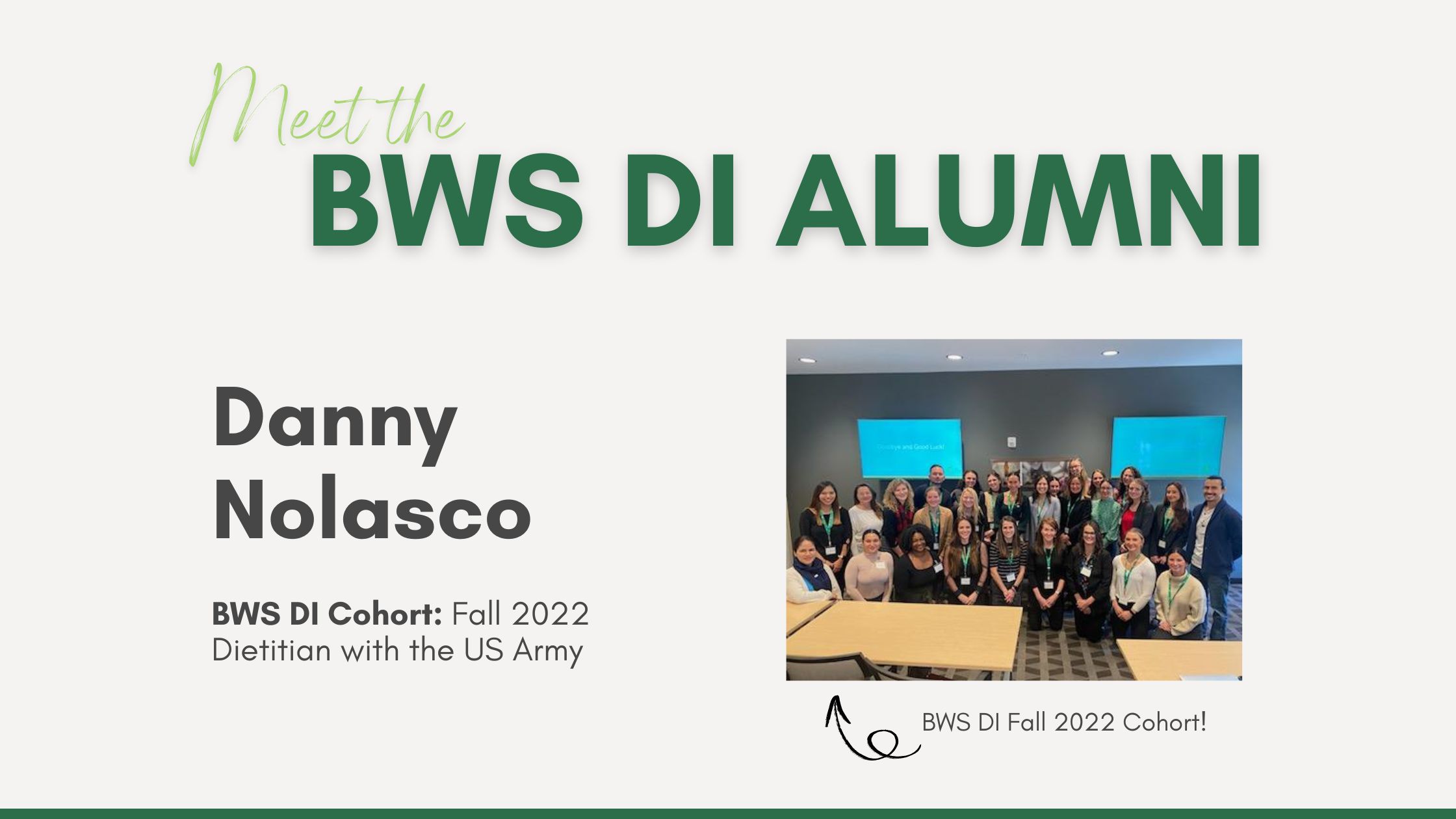
Danny Nolasco: Dietitian with the US Army
-
What is your current job title?
My current position is as a Nutritionist for the Child and Youth Services (CYS) with the US Army. I am currently in the process of transitioning to a new position as a Dietitian with the Holistic Health & Fitness (H2F) program, also with the US Army. This new position with H2F was one of my rotation sites while completing my internship with BWS.
-
What’s a typical day like in your current position?
At my current position, a typical day would start answering any previous day’s emails concerning the food program. I will then prepare for a site visit at one of the facilities for either breakfast, lunch, or p.m. snack. At my site visit I will ensure that the approved menus are being followed and that the cooks are following all food sanitation and safety procedures. This would include an inspection of the kitchen and on-hand inventory.
I will also conduct an observation of the meal service to ensure the classroom providers are following the USDA guidelines for feeding children. Depending on the type of center it will either be a family-style dining meal service or cafeteria-style dining meal service. Additionally, I will review the records associated with the Child & Adult Care Food Program (CACFP) to include meal counts and attendance forms, meal production forms, infant feeding forms, purchase receipts, and inventory.
A typical day with H2F would include starting the day off at morning PT (physical training) and delivering a “turf talk” on a nutrition topic. This can be followed with specific training classes for service members not meeting height and weight requirements. We will then meet with service members for our one-on-one counseling sessions on any topics they may have concerns about. This can include weight management, weight gain/loss, disease prevention or management, Ranger school preparation, and performance nutrition, to name a few common areas. This will then leave time for any special assignments and/or course curriculum development.
-
What’s your favorite part of your job?
My favorite part of my job is the population I work with. While currently working with Army families, we are ensuring their children are receiving proper care and nutrition in our facilities. We can take the worry off the service members’ minds while they fulfill the Army mission. With my future employment with H2F, I will have the opportunity to work with the service members directly to help them maintain their nutritional health as part of a multidisciplinary performance team. The goal of H2F is to “enhance soldier readiness and lethality by optimizing physical and non-physical performance, reducing injuries, and improving rehabilitation, ultimately increasing the overall effectiveness of the Total Army.”
-
How did BWS DI help prepare you for the work you do now?
I had my current position prior to entering my internship with BWS. However, BWS did help me gain experience in new areas of nutrition and building professional relationships. It has not only opened up this new opportunity with H2F, but my other rotation sites have also reached out with employment and collaboration opportunities. Getting this experience between all the different rotations has helped me pinpoint the area I would really like to take my career to moving forward.
-
Do you have any advice or tips for interns about to start their dietetic internship?
When choosing your rotation sites, be open to areas that you may not be familiar with. There are exciting areas out there, and you can use this opportunity to experience them. You may be surprised how much you may enjoy them. In addition, make sure to build lasting professional relationships with not only your preceptors but all the other professionals you encounter. Be sure to follow up with them as you move through your progression of becoming an RD. My job opportunities came when I reached out to my preceptors after passing the RD exam. A simple follow up “thank you” message can open many doors.
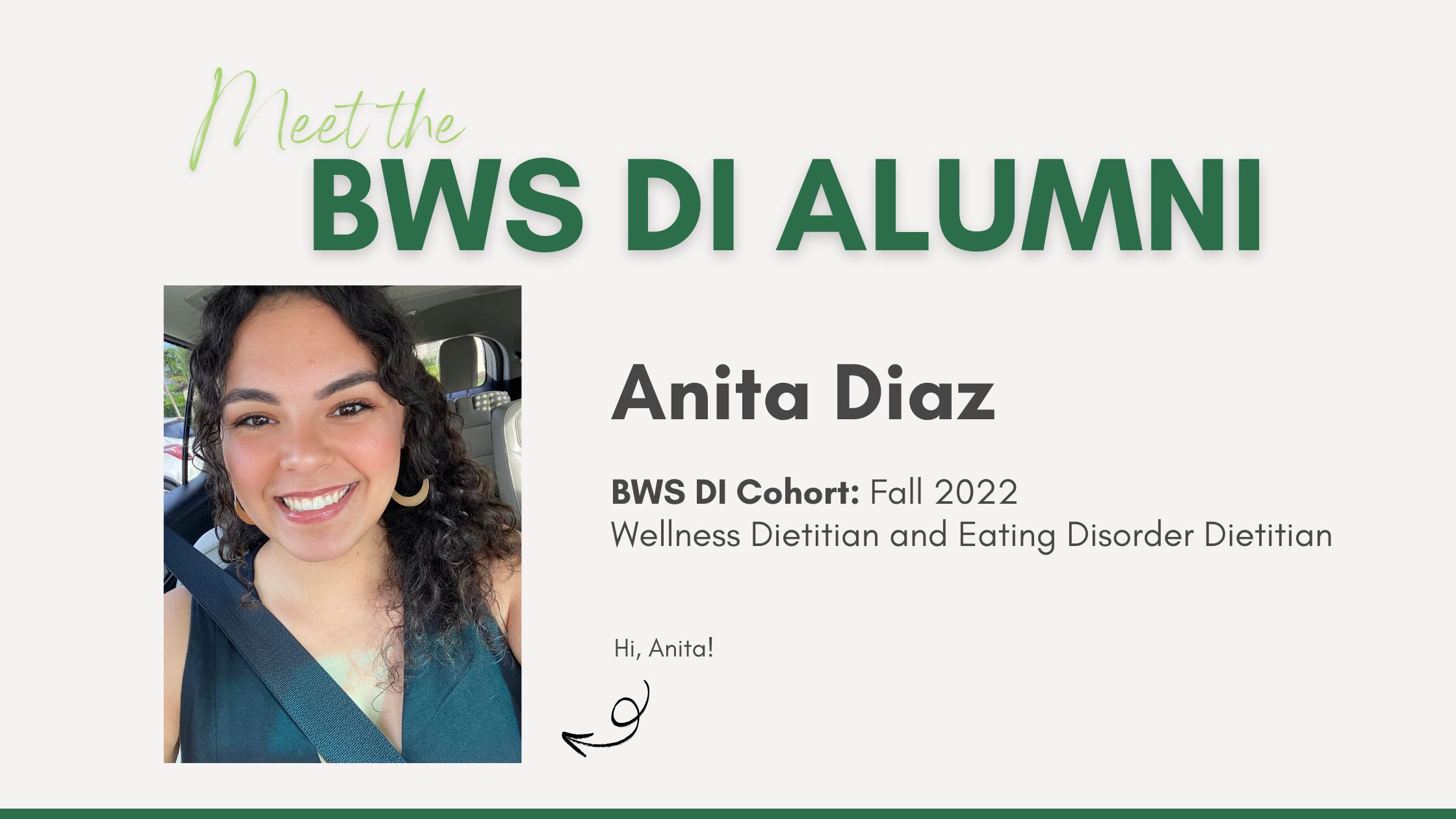
Anita Diaz: Wellness Dietitian and Eating Disorder Dietitian
-
What is your current job title?
I work part-time as a Wellness Dietitian at the University of North Florida and part-time as an Eating Disorder Dietitian at Waves of Hope Eating Disorder Care Center.
-
What’s a typical day like in your current position?
As a Wellness Dietitian at the University of North Florida, my days can look very different from week to week. Most of my time is spent providing nutrition counseling to students, faculty, and staff. Topics that are discussed can range from how to have balanced meals on campus to nutrition for specific health conditions such as high cholesterol, PCOS, and autoimmune conditions. When I am not counseling, you’ll often find me planning events such as cooking demonstrations, “make your own mocktail” bars, or handing out nutritious snacks around campus. The last part of my job includes content creation, whether that’s creating social media posts or making new handouts for nutrition counseling sessions.
At Waves of Hope Eating Disorder Care Center, a key part of my job is to provide meal support. Meal support involves sitting with clients during meals and snacks to provide support as they work to implement coping skills, challenge fear foods, and manage the mental/emotional/physical distress that can accompany mealtimes for those struggling with eating disorders. Outside of meal support, I provide individual nutrition counseling to clients on a weekly or bi-weekly basis. Individual sessions typically focus on individual progress, struggles, and future goals for treatment. Lastly, I conduct nutrition groups for clients. Groups might include nutrition education or leaving the facility for a snack outing or grocery shopping exposure.
-
What’s your favorite part of your job?
One of my favorite parts about my job is the diversity. Every day looks different, and there are a variety of activities that are part of my daily schedule. With nutrition counseling, there is always something new to learn, whether it’s learning more about a certain health condition or trying a new counseling technique. I also love engaging with clients and helping them get excited about making nutritional changes. Seeing people in all different stages of change is particularly rewarding, especially when you get to witness their progress over time. I get to watch them build confidence in themselves and feel proud when they accomplish the goals that are important to them.
-
How did BWS DI help prepare you for the work you do now?
One of the ways that BWS DI helped prepare me for the work that I do now is by keeping me engaged in and practicing my research skills. For evidence-based practice, it’s important to stay up to date on research and to be able to evaluate research effectively. BWS DI also prepared me to create and present professional-level presentations, written materials, and other resources. The faculty advisors provided valuable feedback that improved my skills and allowed me to enter the workforce with increased confidence about my strengths and abilities as a new dietitian.
-
Do you have any advice or tips for interns about to start their dietetic internship?
If you are starting your dietetic internship, my advice is to remain open to all opportunities. This is the time to keep an open mind and explore areas of practice that you may not have considered before. You might find that you actually enjoy an area of practice that you hadn’t previously considered, or you might discover new skills that you want to learn. Now is the time to explore, try different things, and see where your path takes you! One last thing: If you’re like me and experience some major imposter syndrome – remember that you are knowledgeable, capable, and worthy of the opportunities that are in front of you. You’ve made it this far for a reason, and you are going to do amazing things! Believe in yourself because you have a whole team of people who believe in you and will be there to support you. You’ve got this!
Becoming a Dietitian Opens the Doors to Many Career Possibilities
There are many positive aspects to being a registered dietitian, including the diverse career opportunities. Whether you are drawn to clinical, private practice, corporate wellness, or another path in this field, the options and impact of this profession make it a great field to consider pursuing.
We’re committed to helping future dietitians gain the experience and confidence needed to enter the nutrition field and begin building the careers they envision. When you’re ready to take the next step, we’d love for you to explore our program and see if the Be Well Solutions Dietetic Internship Program is the right fit for you.
